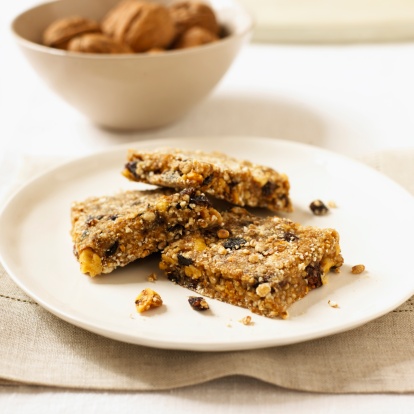
As a nutritionist I loathe “diet” foods, meaning processed products with labels including terms like reduced fat and sugar free—and according to a recent report, consumers are with me. Shoppers are curbing their consumption of foods with “better for you” label terms like low sugar, low carb, and fortified. In fact, the data show that these kinds of products are in their sixth straight year of decline.
Part of the shift is a movement toward foods that are real, rather than altered. As a fan of natural foods and clean eating, I’m all for it. But “natural” doesn’t inherently mean healthy. Here are three key points to consider when evaluating natural products, and some pitfalls to avoid.
Read more: 10 Easy Ways to Slash Sugar from Your Diet
Read the ingredient list
You may be surprised to learn that the Food and Drug Administration (FDA) hasn’t developed a legal definition for the term natural. They allow its use if a product doesn’t contain added color, artificial flavors, or synthetic substances, but there is definitely a lot of gray area regarding the interpretation of natural. For example, carrageenan is an ingredient that can be derived from seaweed, but I bet you’ve never seen it sold at your local farmer’s market or supermarket. And while it’s technically natural, its consumption has been tied to digestive problems and inflammation, a known trigger of premature aging and diseases, including obesity.
What to look for: Use the term natural as a starting point, then always read the ingredient list. It should read like a recipe you could craft in your own kitchen. In other words, you should think, “I could have gone to the market, bought all of these ingredients, and made this myself, but I didn’t have to, because someone else made it for me.” I call that “homemade for you” and to me, it’s the true mark of a clean product.
Read more: 12 Crazy Things That Happen to Your Food Before You Buy It
Check the sugar content
I recently attended the Natural Products Expo West in Anaheim, California, where literally thousands of natural foods and goods are featured. As I sorted through the myriad energy bars, sports drinks, and snack foods, one thing was clear: many natural products are loaded with sugar! And while I would rather see someone consume a natural form of sugar over an artificial sweetener, the amount of sugar you consume still matters.
What to look for: The type of sugar you need to limit is called added sugar, the kind put into a food by the manufacturer—not what’s inserted by Mother Nature, like the naturally occurring sugar found in fruit. Unfortunately, the current Nutrition Facts label lumps these two together, which means if a food contains both naturally occurring sugar and added sugar (like yogurt with both real fruit and sugar added), there’s no way to tell how much comes from each type.
The only way to glean more info is to read the ingredients. If you see sugar grams listed on the Nutrition Facts panel, but no sweeteners appear in the ingredient list, you know that no sugar was added, so any grams listed are all naturally occurring. But if you see any terms like these, it means sugar was added: brown sugar, cane sugar, evaporated cane juice, coconut sugar, honey, maple syrup, molasses, brown rice syrup, agave, or date sugar. (And take note: some manufacturers use multiple types of sugar in the same product.) For added sugar, every 4 grams on the Nutrition Facts label represents one teaspoon, and the American Heart Association recommends that women and men limit their daily intake of added sugar to six and nine teaspoons, respectively.
Read more: 10 Reasons to Give Up Diet Soda
Scope out refined grains
I’m all about eating real food, but it drives me bonkers when natural foods that contain refined grains are perceived as healthy. I was at a health food store with a client recently, and at least half a dozen foods he regularly buys contained refined starch, like gluten-free crackers made with white rice flour, and vegan cookies made with organic, but still refined, wheat flour.
What to look for: I’m not saying there isn’t a place for treats or splurges—there is. And I would absolutely rather see someone eat a cookie made with natural ingredients rather than manufactured ones, even if that cookie contained white flour and sugar. But I think it’s important to note that there are now plenty of natural and organic versions of processed foods are still, well, processed. To maximize the quality and nutritional value of your overall diet, you should limit these products and focus on whole food options, like hummus and veggies over chips, and fruit, nuts, and dark chocolate over sweet treats. Bottom line: quality is king.
Read more: 16 Most Misleading Food Labels
Cynthia Sass, MPH, RD, is Health’s contributing nutrition editor, and privately counsels clients in New York, Los Angeles, and long distance. Cynthia is currently the sports nutrition consultant to the New York Rangers NHL team and the Tampa Bay Rays MLB team, and is board certified as a specialist in sports dietetics.
More Must-Reads from TIME
- Cybersecurity Experts Are Sounding the Alarm on DOGE
- Meet the 2025 Women of the Year
- The Harsh Truth About Disability Inclusion
- Why Do More Young Adults Have Cancer?
- Colman Domingo Leads With Radical Love
- How to Get Better at Doing Things Alone
- Michelle Zauner Stares Down the Darkness
Contact us at letters@time.com